How do you know, how well
the engine is running?
- Through experience, feedback and info.
Info through gauges is large step forward. But which should you choose and what
do they show? And are you tired of the regular gauges and want new faces?
TOC
1. Brands of gauges
2. What gauges do you need
3. What can they tell you
4. New faces for stock gauges
5. How to mount the colored faces on the stock instrument
cluster
Brands:
Good brands are:
- VDO
- Auto meter
- Stewart Warner
What gauges do you need
Here is my suggestions for needed extra gauges:
- Boost pressure
- Oil temperature
- Oil pressure
For more power-hungry people should also consider the following:
- Fuel pressure
- Air-Fuel meter (Lambda)
- Exhaust temperature
- Air temperature after Intercooler
- Air temperature after Turbo
And for those who wants even more:
- Cylinder head temperature
- Gearbox temperature
- Logging Tachometer
This list can go on and on, but I end here. This should be enough for most
people.
What can they tell you
Ok, You've installed the extra gauges, and now what. What do they really tell
you? Well it's all up to you and experience to make them out. But here's some
pointers.
- Boost pressure
If you got a dual pressure version (both positive and negative
pressure).
The positive is the boost
The negative is the raw suction of the engine (should be between -0.7 to -0.9
bar on a healthy engine)
- Oil temperature
The temp of the oil, should be around 80 degrees Celsius ( 176 Fahrenheit),
If to high more efficient oil cooler is needed.
- Oil pressure
Should be around 2.7 bar(39 Psi) @ 2000 RPM and @ 80 C (176 F) and 10W/30
Oil
Should never drop under 0.5 bar (7.2 Psi), could be leakage or low oil-level or
such.
Should never go higher than 5.2 Bar (72 Psi), oil pump overpressure valve could
be blocked or broken or such.
- Fuel pressure
It depends where you attach it. Before the FPR, on the Fuel rail. But
basically it shows the pressure.
- Air-Fuel meter (Lambda)
Shows the Air-fuel ratio of the engine. It's really important that the car
doesn't run to lean! If it does... add more fuel.
Too much the engine chokes.
- Exhaust temperature
Well, no comment. Too high is not good. Better flow is then needed
- Air temperature after Turbo
How hot is the air after the compressor. Should be used with the next gauge
(Air-temp after IC) to be really useful.
- Air temperature after Intercooler
How hot is the air after the Intercooler. Should be used with the previous gauge (Air-temp after Turbo) to be really useful.
Together they can show how effective the IC is. The temp after the intercooler
should be as low as possible.
- Cylinder head temperature
Well, no comment. Too high is not good. Should be used together with other
gauges to be really useful (example, Oil-temp, water-temp, etc) If too high then
you need to check the cooling, maybe get some more airflow around the engine.
And ask yourself why it gets so hot.
- Gearbox temperature
Once again, no special comment. Too high is not good. Due to the
construction of the gearbox (top of the gearbox is the oil pan of the engine)
could it be hard to cool the gearbox. But if the engine is relative cool, the
gearbox should be cooler than the engine.
- Logging Tachometer
"How high was that rev last race?" Well with a logging tach you'll
know. And when the engine blows, you will know with the next engine you
shouldn't rev 7635 RPM on the B202 ;) or something.
New faces for stock gauges
But you already got a set of gauges and here's some new faces for them. You
should use a good image processing application to print these gauges. Adobe
Photoshop is one example.
These gauges are free. FREE.
If any one tries to make any money out of them...
I will know if that happens.
SAAB enthusiasts communicate fast.
Select Your color
just click on the gauge you want and it will download.
 |
 |
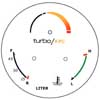 |
| 900aero.com
RPM |
900aero.com
speedo w griffin |
900aero.com
turbo |
 |
 |
 |
| 900aero.com
RPM |
900aero.com
speedo kmh |
900aero.com
speedo mph |
 |
 |
 |
| Regular
RPM by Rolle |
Regular
Speedo by Rolle |
Regular
turbo by Rolle |
 |
 |
 |
| Griffin
Speedo by Rolle |
RPM by Bastion |
MPH speedo
by Bastion |
|
|
|
|
|
|
 |
 |
 |
| 900aero.com
RPM |
MPH speedo
by Brian |
MPH speedo
by Brian |
 |
 |
 |
| 900i
RPM |
900i
Speedo |
900i
fuel |
 |
 |
 |
900aero.com
900i RPM |
900aero.com
900i
Speedo w griffin |
900aero.com
900i Fuel |
| Other
cars |
|
|
 |
 |
 |
Seat
Ibiza 1.4
Fuel |
Seat
Ibiza 1.4
RPM |
Seat
Ibiza 1.4
Speedo KMH |
 |
|
|
Seat
Ibiza 1.4
Temp |
|
|
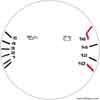 |
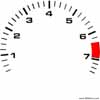 |
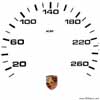 |
Porsche
944
Oil & Battery |
Porsche
944
RPM |
Porsche
944
Speedo |
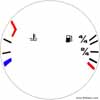 |
|
|
Porsche
944
Temp & Fuel |
|
|
I'll show you later
how to do it on this page.
And thanks goes to Rolle, Brian and Bastion!
You know who you are!
How
to mount the colored faces on the stock instrument cluster
First print the
gauges on an appropriate paper. If you select a thin paper you might need
another piece of paper behind the first one so the black shouldn't shine
through.
Then you need to disassemble the dashboard to get the instrument cluster out.
After you've got the instrument cluster out, the disassemble the cluster.
The gauges is accessible from the backside of the cluster housing.
When the gauges is out, now you need to remove the arms of the gauges. NOTE!
Several of the arms are spring worked! So you need to lift the arm over the pin
that stops the arm. And then mark the place where the arm stops.
Then you need to remove the arms from the gauge rod. USE CAUTION! Use what you
need to remove them (needle nose pliers, two screwdrivers, two knifes) but use
common sense. But remember you'll need them again.
When the arms are gone just "slide" the new gauges over the old one.
Make holes for the "stop" pins and the axis.
Now it's only to put it all back, Good luck. You'll need it.




























